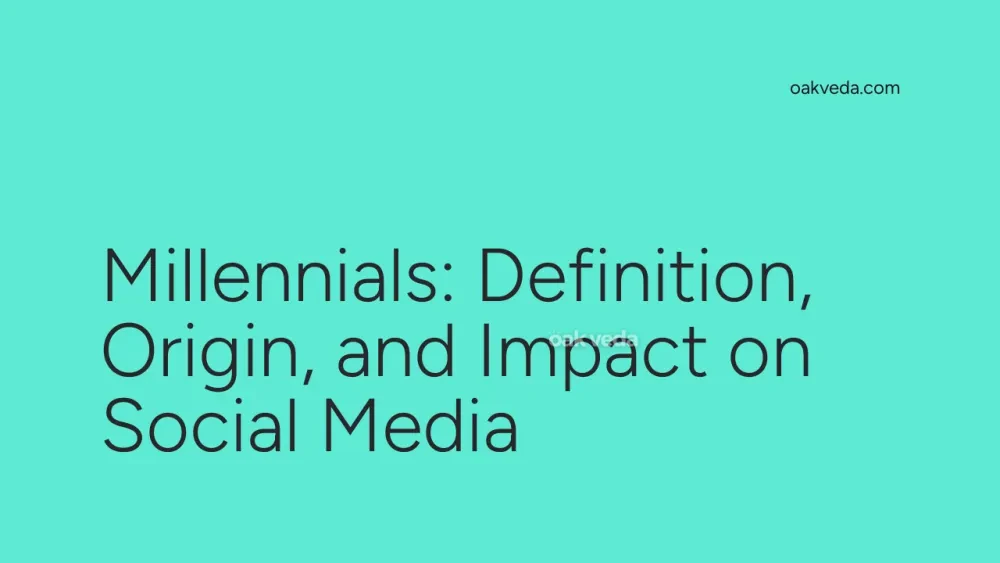
What are Millennials?
Millennials, also known as Generation Y, are a demographic cohort born between the early 1980s and mid-1990s to early 2000s. This generation has grown up alongside rapid technological advancements, shaping their worldview and digital habits. As digital natives, millennials have played a significant role in the evolution of social media and online culture.
Origin and Development of the Millennial Generation
The term "millennial" was coined by historians Neil Howe and William Strauss in their 1991 book "Generations." It refers to the generation coming of age around the turn of the millennium. While exact birth years vary, most researchers agree on a range between 1981 and 1996.
How Millennials Interact with Social Media
Millennials are known for their high engagement with social media platforms. They use these tools not just for communication, but also for self-expression, career development, and social activism. Some key characteristics of millennial social media use include:
- Multi-platform presence
- Content creation and sharing
- Preference for visual and interactive content
- Use of social media for brand research and purchasing decisions
Types of Millennial Social Media Users
While it's important to avoid overgeneralization, researchers have identified several common types of millennial social media users:
- The Creators: Those who actively produce and share original content
- The Curators: Users who collect and share content from various sources
- The Connectors: Individuals focused on building and maintaining relationships online
- The Consumers: Those who primarily observe and consume content without much interaction
Popular Social Media Platforms Among Millennials
Millennials have embraced various social media platforms, with preferences evolving over time. Some of the most popular platforms include:
- TikTok
- YouTube
Each platform serves different purposes, from personal branding on Instagram to professional networking on LinkedIn.
Impact of Millennials on Social Media Culture
Millennials have significantly influenced social media culture in several ways:
- Authenticity: They value genuine, transparent content over polished, corporate messaging.
- Social Activism: Millennials often use social media to raise awareness about social and political issues.
- Visual Communication: This generation has driven the rise of image and video-based platforms.
- Influencer Culture: Millennials have played a key role in the emergence and growth of social media influencers.
- Digital-First Approach: They expect brands and services to have a strong online presence and digital offerings.
Controversies and Debates Surrounding Millennials on Social Media
The relationship between millennials and social media has sparked several debates:
- Mental Health Concerns: Studies have explored the impact of social media use on millennial mental health and well-being.
- Privacy Issues: Millennials' willingness to share personal information online has raised privacy concerns.
- "Slacktivism": Critics argue that social media activism among millennials doesn't always translate to real-world action.
- Work-Life Balance: The always-on nature of social media has blurred lines between personal and professional life for many millennials.
How Brands and Influencers Engage Millennial Audiences
To effectively reach millennial audiences on social media, brands and influencers often:
- Emphasize authenticity and transparency
- Support social causes and demonstrate corporate responsibility
- Create interactive and visually appealing content
- Offer personalized experiences and products
- Leverage user-generated content and community engagement
Future Trends: Millennials and Social Media
As millennials continue to shape social media trends, several developments are likely:
- Increased Focus on Privacy: Growing awareness of data issues may lead to more privacy-conscious social media use.
- Rise of Niche Platforms: Millennials may gravitate towards more specialized, interest-based social networks.
- Integration of AR and VR: As these technologies advance, they may become more prevalent in social media experiences.
- Emphasis on Well-being: Platforms may evolve to address concerns about the mental health impacts of social media use.
FAQs about Millennials and Social Media
-
How much time do millennials spend on social media? On average, millennials spend about 2 hours and 38 minutes per day on social media platforms.
-
What distinguishes millennial social media use from other generations? Millennials tend to be more active content creators and are more likely to use social media for professional networking and brand engagement.
-
How has millennial social media use influenced marketing strategies? Marketers have shifted towards more authentic, values-driven content and increased use of influencer partnerships to reach millennial audiences.
-
Are millennials moving away from traditional social media platforms? While millennials still use mainstream platforms, there's a growing interest in niche networks and privacy-focused alternatives.
-
How do millennials use social media for career development? Many millennials use platforms like LinkedIn for networking, job searching, and personal branding to advance their careers.
In conclusion, millennials have played a pivotal role in shaping social media culture, driving trends towards authenticity, visual communication, and social engagement. As this generation continues to evolve in their digital habits, they will likely continue to influence the direction of social media platforms and online interactions for years to come.
You may be interested in:
- Earned Media Value: Definition, Origin, and Impact
- Rent-Free: Definition, Origin, and Impact on Social Media
- Media Kit: Definition, Origin, and Impact on Social Media
- Salty: Definition, Origin, and Impact in Social Media
- Milkshake App: Definition, Origin, and Impact on Social Media
- FYP (For You Page): Definition, Origin, and Impact

